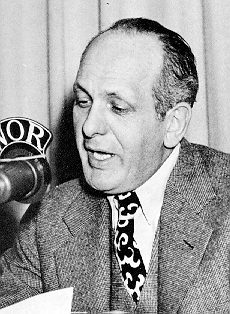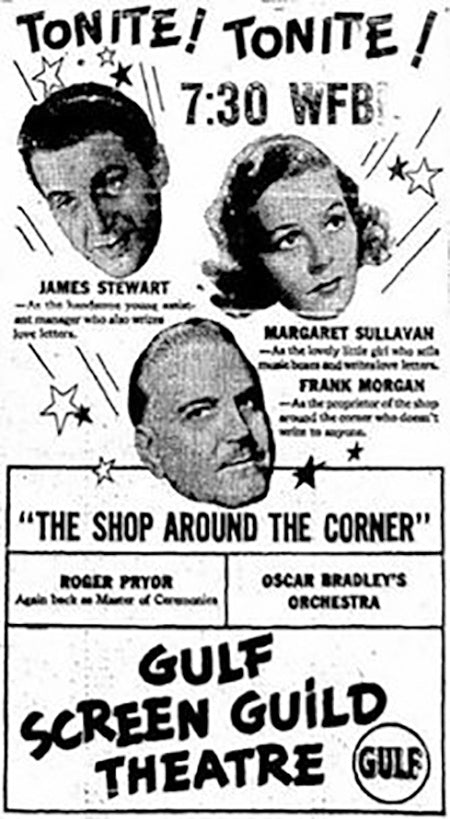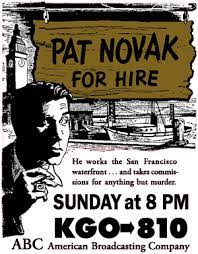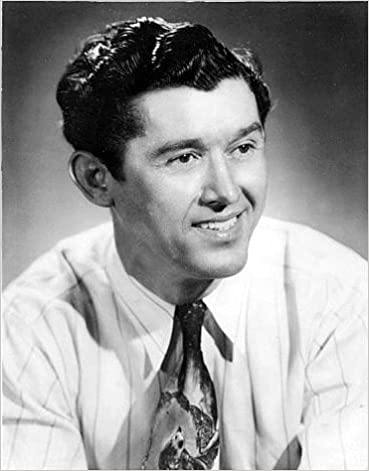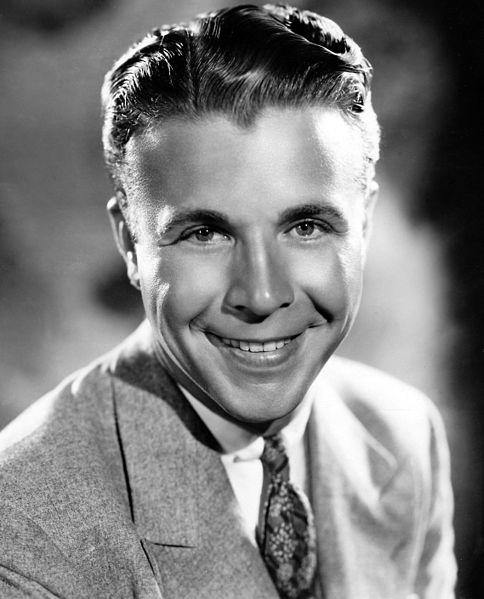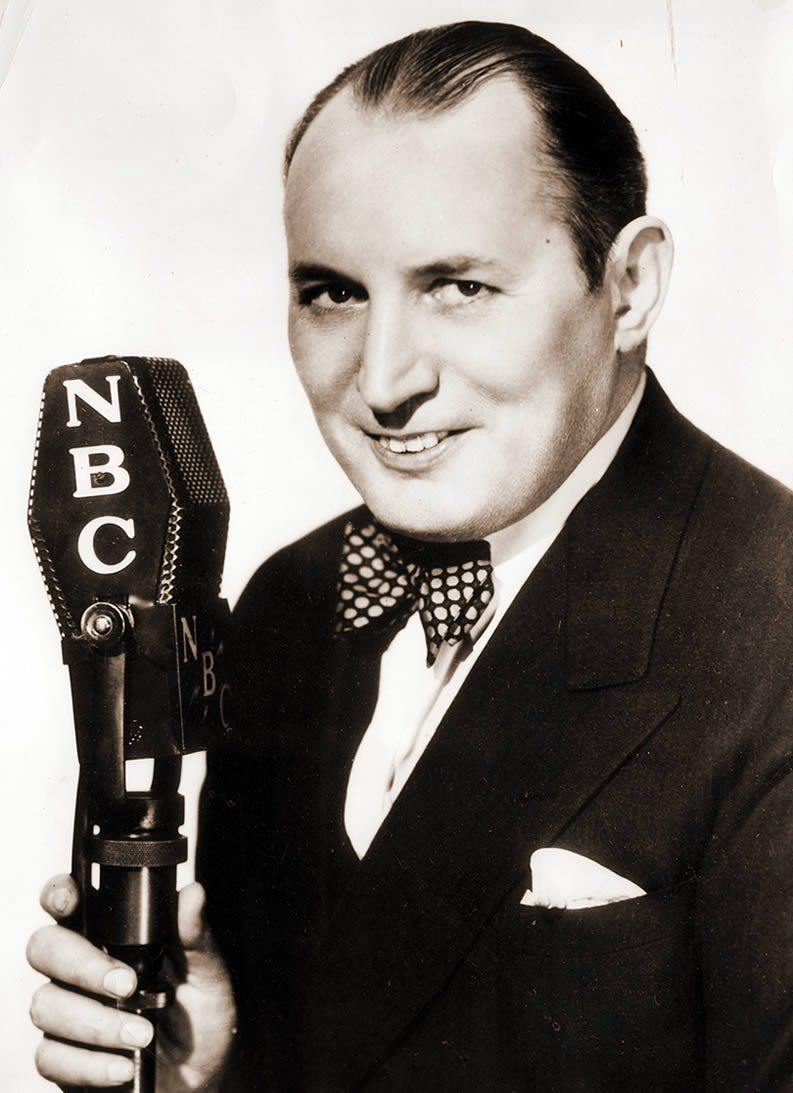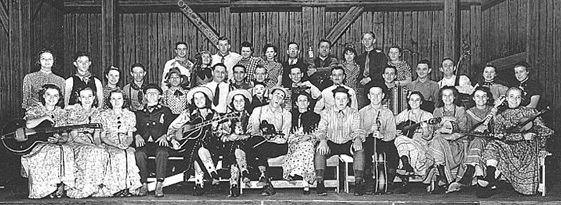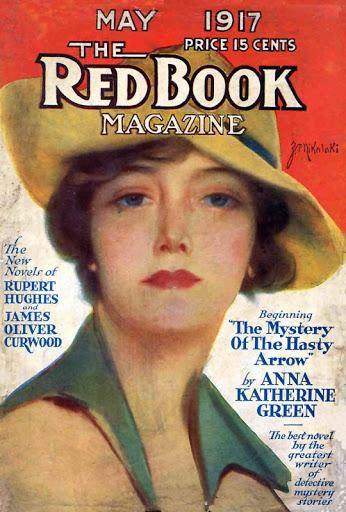Gabriel Heatter (September 17, 1890, New York City – March 30, 1972, Miami, Florida) was an American radio commentator whose World War II-era sign-on (“There’s good news tonight”) became both his catchphrase and his caricature. He also gave the self-help group Alcoholics Anonymous its first national exposure with a 1939 interview, and earned an unusual reputation—even in a less media-driven and cynical time—for morale boosting during some of the U.S.A.’s most arduous days.
Early days
The son of Jewish immigrants from Austria, Heatter grew up in Brooklyn. His mother woke Gabriel and his brothers Max and Edward every day at 5AM to deliver baskets of food to poor people in the neighborhood (at that early hour so the people wouldn’t be embarrassed by being seen to accept charity). For the rest of their lives the boys always woke up at 5AM. Young Heatter, who found school difficult but had a passion for reading—and a rare speaking ability—became a sidewalk campaigner for William Randolph Hearst during the publishing giant’s 1906 mayoral campaign. Heatter after his high school graduation became a society reporter for the tiny weekly,
The East New York Record before joining the
Brooklyn Daily Times, which led to his being offered a job with Hearst’s
New York Journal.
To the Air
But it was an article he wrote for
The Nation in 1931, in which he debated with the prominent Socialist Norman Thomas and argued against the Socialist Party’s existence in the U.S. that helped steer Heatter to radio. In December 1932, he was invited by Donald Flamm, owner of New York’s WMCA, to debate a Socialist on radio, and when the Socialist was unable to make the date, Heatter had the program almost to himself. His performance impressed both Mr. Flamm and the listeners. A few months later, he went to work forWOR, as a reporter and commentator. His audience expanded when in 1934, WOR became the flagship station of the newest network, Mutual Broadcasting. Heatter’s big break came when he was sent to cover the trial of Bruno Hauptmann, the man accused of kidnapping the infant son of aviator Charles A. Lindbergh. Heatter’s reporting wielded as much influence as that of better-known radio correspondents (Walter Winchell was among those covering the Hauptmann trial), and his audience continued to grow. Perhaps the most difficult aspect of covering the trial was when, in 1936, he had to report on the execution. It was delayed, forcing Heatter to continue ad-libbing while awaiting word of when it would occur. His professionalism under pressure and his ability to keep the audience informed without resorting to sensationalism earned him critical praise.
“There’s good news tonight!”
Then, during World War II, during a particularly bleak period, American forces sank a Japanese destroyer and prodded Heatter to take the air for his nightly commentary by opening accordingly: “Good evening, everyone—there is good news tonight.” The phrase sparked a small flurry of letters and calls, almost all in his favor, but Heatter would likely have been inclined to keep it in, anyway. He was already well known for trying to find uplifting but absolutely true stories to feed his commentaries as it was—he was especially known for a fondness for stories about heroic dogs, despite a phobia for dogs not his own. And he gave the first national broadcast exposure (in April 1939) to a burgeoning self-help group known as Alcoholics AnonymousSo much so was he known for those kinds of things that one critic composed a particularly lacerating doggerel: “Disaster has no cheerier greeter/than gleeful, gloating Gabriel Heatter.” But when the war finally ended, first in Europe and then in Japan, there were probably millions who would not have believed it until they heard it from Heatter. Indeed, his broadcast upon V-E Day is still considered a classic of radio commentary. He was just as influential upon coming generations of journalists as were more dynamic radio figures such asEdward R. Murrow. Eric Sevareid, Walter Winchell, Drew Pearson, and Fulton Lewis, Jr.
There Was Bad News Every Day
The paradox was that this national comforter—and, in an apparent rarity for public figures, a man devoid of scandal—may have needed an awful lot of comfort himself, as Heatter admitted when he wrote in due course that one secret to his uplifting style was that by trying to pick himself up, he seemed able to pick others up as well. Insecure to the point of tears in moments alone, Heatter as often as not could barely compose himself when a stranger said hello to him or praised him; he was unable to eat what was put in front of him at formal affairs and often tucked a carefully wrapped sandwich of his own to eat; as much as he loved dog stories and his own dogs, strange dogs on the street terrified him; he was fortunate to have a wife and family who understood and supported him and never seemed to have assailed or criticized him for the insecurities his listeners would never have believed. The audience of the 21st Century, had it known of the turmoil that roiled him, would probably consider him a prime candidate for deep psychoanalysis, a candidacy Heatter himself would probably have rejected.
The Revelation
Heatter remained with Mutual until, like many of the Depression and wartime broadcasters and commentators, his influence gave way to a newer generation of broadcasters – those who made the transition to television, or started in TV bypassing radio entirely. By the 1960s, Heatter was all but retired. Not until the 1960 publication of
There’s Good News Tonight did those who waited hungrily for his nightly news for so many years get a chance to understand what Heatter had to overcome just about every day of his life to make it on the air. But according to Irving Fang, author of
Those Radio Commentators, “That turmoil seemed to subside as the years passed by. Age gave this gentle, decent man a kind of serenity.” After his wife’s death, Heatter lived in retirement with his daughter until he died of pneumonia in 1972. The audiences who were comforted by his melodious voice and his ability to find the best in even the worst news must have felt that it hurt to lose a cherished friend, but that it was a comfort to believe, in turn, that Heatter had gone to a gentler place where he, for a change, would be the comforted. His daughter is the cookbook writer Maida Heatter. His granddaughter was the artist Toni Evans. His son is the novelist Basil Heatter. His nephew Merrill Heatter is a television writer and producer (Heatter-Quigley Productions).
In popular culture
In 1944, Heatter appeared as himself, uncredited, in the wartime Cary Grant film
Once Upon a Time. In 1950, he appeared as himself in the movie
Champagne for Caesar. Heatter was also heard, but not seen, as one of four broadcast journalists portraying themselves in the 1951 film
The Day the Earth Stood Still. At the height of his fame, when he was getting a huge amount of fan mail, the post office delivered many letters that were simply addressed “Gabriel Heatter,” without an address… and even one envelope that had no words on it, just two small pictures: the angel Gabriel blowing his horn; and an electric heater, radiating warmth. He is also mentioned, comically, in Yorgi Yorgesson’s Christmas novelty “I Yust Go Nuts at Xmas.”
Get the 7 episode MP3 disc here.
 Born: September 17, 1890, New York City, New York, USA Died: March 30, 1972, Miami Beach, Florida, USA
Born: September 17, 1890, New York City, New York, USA Died: March 30, 1972, Miami Beach, Florida, USA
